- Home
- Rebecca Levene
Kill or Cure
Kill or Cure Read online
KILL OR CURE
My fingers had almost slipped from the railing when something inside me shouted and I jerked back into consciousness. For a second, it had sounded like a voice. Like the Voice - willing me not to let go just yet. But it couldn't be, could it? The anti-psychotics were supposed to have killed that Voice for good.
And then I didn't really care about it anymore, because my head swung round as I tried desperately to claw my other arm up to the railing, to drag myself back onto the deck - and I finally saw the boat which had been pursuing us.
At first I thought I might be delirious, that the side of the boat had cracked my head as well as my ribs. Because the people on that boat... they shouldn't have been alive. Not in any sane universe.
An Abaddon BooksTM Publication
www.abaddonbooks.com
[email protected]
First published in 2007 by Abaddon BooksTM, Rebellion Intellectual Property Limited, Riverside House, Osney Mead, Oxford, OX2 0ES, United Kingdom, UK.
10 9 8 7 6 5 4 3 2 1
Editor: Jonathan Oliver
Cover: Mark Harrison
Design: Simon Parr & Luke Preece
Editorial Assistant (eBooks): Jennifer-Anne Hill
Marketing and PR: Keith Richardson
Creative Director and CEO: Jason Kingsley
Chief Technical Officer: Chris Kingsley
The Afterblight ChroniclesTM created by Simon Spurrier & Andy Boot
Copyright © 2007 Rebellion. All rights reserved.
The Afterblight ChroniclesTM, Abaddon Books and Abaddon Books logo are trademarks owned or used exclusively by Rebellion Intellectual Property Limited. The trademarks have been registered or protection sought in all member states of the European Union and other countries around the world. All right reserved.
ISBN (.epub format): 978-1-84997-006-8
ISBN (.mobi format): 978-1-84997-028-0
A CIP record for this book is available from the British Library
No part of this publication may be reproduced, stored in a retrieval system, or transmitted in any form or by any means, electronic, mechanical, photocopying, recording or otherwise, without the prior permission of the publishers.
This is a work of fiction. All the characters and events portrayed in this book are fictional, and any resemblance to real people or incidents is purely coincidental.
THE AFTERBLIGHT CHRONICLES
KILL OR CURE
Rebecca Levene
For Carrie O'Grady, without whom I'd never have been able to figure out the plot of this damn thing.
And also because she's a top bird.
PROLOGUE
You know what they say - about being able to see yourself reflected in the pupils of someone's eyes? Bullshit. When you're standing that close to a man, all you can see in the centre of his eyes is darkness. But when I looked at him, I did see myself. An epileptic flash of memory on my retina, I saw myself back when I'd first met him. Jesus, how was it possible to ever be that young? And then an epileptic flash of the future, I looked at him and saw what I would become.
He smiled, a vivid flash of white in the brown of his face. And, despite everything, I smiled back. "Jasmine," he said. "How did this happen? How did you and I come to this?"
I raised the gun and pressed the muzzle hard into his cheek, the soft flesh yielding around it. I gave him the gun, because it was easier than the answer.
The answer started months before, back when my world was a hundred foot square and white, and there'd been no one to share it with for five years. I didn't mind, though. I didn't care very much about anything then as my mind, and everything that made me me, snoozed contently under a warm blanket of opiates.
I don't know if you've ever got high. It's like a golden glow that spreads out through your veins and rushes into everything; into every dark corner of you. It makes you feel that everything is absolutely fine, like main-lining optimism. Forget the physical high, the orgasmic rush - it's that unshakeable fine that makes it all worthwhile.
Or at least, that's what it's like to begin with. After the first few times, it's more like scratching an itch. And the longer you feed it, the deeper and crueller the itch gets. Normal people find it almost impossible to stop. Junkies get clean in prison and swear they're never going to let that shit screw up their lives again.
But when they're out and their life just isn't fine, but they know something that will make it feel that way... people who've tried it don't call it junk. They know better than that.
For junkies it's hard, but for me it was impossible. Because the morphine in my veins was the only thing that blotted out the Voice in my head. I could always hear it, whispering and giggling at the edge of my consciousness, but with enough drugs inside me I couldn't quite make out the words.
That morning started the same way every morning had for the last five years: first the Voice and then the drugs. It was always the Voice that woke me, growing louder as the protective blanket of morphine slipped away. Maybe outside there might be something to distract me from it. In here there was nothing. Just a small white warren, five corridors, two labs, - one half-wrecked - an office with a long fritzed computer and the corpses of two of my colleagues, desiccated now, embracing in the cleaning cupboard where I locked them until the smell of decaying flesh became bearable. There were only two books, one by Geoffrey Deaver and the other a microbiology textbook, both of which I'd read so often that I could recite them pretty much by heart. The morphine helped with the boredom, too. And the terrible loneliness.
There was a cannula in my arm. I'd treated enough smack addicts in my time to know that you didn't want to keep digging fresh holes in your veins, because pretty soon the ones in your arms would be on the point of collapse, pocked with gaping, pustulant sores, and then you'd find yourself moving on to the ones in your thighs, your eyeball. I'd seen junkies without a penis, rotted away where they'd kept on injecting, even as the flesh festered and died, the pain less important than the hit.
So I fixed a cannula in my arm, like a terminal patient in a cancer ward. All I needed to get my fix was to empty the ampoule into a syringe and push the needle through the rubber tube permanently hanging from the crook of my elbow like the open, hungry mouth of a baby bird, desperate for that next meal. I could feel the excitement build up as I put the tip of the syringe in place, my heart rate speeding as I anticipated the rush. Junkie thinking, I knew. But what else did I have to live for?
Yeah, there was one answer to that, but he was on the other side of the world and probably dead and, anyway, I couldn't give him me without giving him the Voice, and I thought that was one thing I should keep to myself.
That day, though, I wasn't even thinking about him. I didn't think about anything much by then, the thoughts in my head so repetitive they'd begun to wear thin, like an old video played over and over. All I thought about was getting the drug into my system.
I'd started pressing down on the plunger of the syringe, the first molecules of opiate trickling into my blood, when I heard it. A voice.
A voice, but not the Voice. It was coming from the one break in the whiteness, the mound of rubble from the explosion which had trapped me in here, back when the world still had some hope in it.
It was coming from outside.
Christ.
My brain was still fuzzy from yesterday's drugs and the white noise of the psychosis they helped to mask. It couldn't quite process this. I had to think this through one step at a time. Voices meant people. Voices meant people inside the base - deep inside. The explosion had only sealed off the innermost areas. They couldn't have just wandered into a military base on an island in the middle of a lake. They'd come here deliberately. They were looking for something.
We
re they looking for me?
Who was looking for me?
For a moment I felt a flare of sharp, bright hope - a spike of emotion stronger than anything I'd ever got from the drugs. It was him, it had to be. Who else would come to this place, after all this time, to hunt me down? But a moment later, reason swum up sluggishly through the murky waters of my thoughts.
If it was him, why hadn't he tried to contact me? The comms unit had been sealed in along with me, powered like the rest of the base by generators built to survive a nuclear war. If he thought I was alive, he'd know where I was. But there was no way he'd think I was alive. I shouldn't be alive. I could have let him know different, but for five long years I'd chosen not to, because the price I'd paid for survival was too high, and I preferred him to remember me as I was than as what I'd become.
And then I heard the voices more clearly, calling out instructions to each other about clearing the rubble, and I knew for sure that it wasn't him. Because his voice was deep and just a little gravely and these voices were light, with an accent I couldn't quite place.
"Getting thermal signs of a living body behind here," one of the voices said with sudden clarity. Shit! They knew I was here. These strangers, whoever they were, were coming for me - to take me away, to kill me, to do whatever they wanted with me. And suddenly all the reasons that had kept me from getting in touch with him didn't feel like enough and I wanted to hear his voice one last time before I died.
The comms unit was two rooms away, tucked into the back of the base. A part of me wanted to stay and face whatever was coming head on. But I could hear the clanging of heavy machinery and I knew that they'd be through the rubble soon; I'd only have this one chance.
The walk to the comms unit seemed to last forever. The opiates were beginning to flush themselves out of my system, leaving behind a dull ache in my limbs, a cold sweat and emptiness in my head - just the kind of vacuum that nature abhors. The Voice grew louder as I walked, filling the void, its cadence following the rhythm of my footsteps, echoing through my mind in time with the shivers which were beginning to wrack my body. I could make out words now, 'blood' and 'cure' and other, more brutal words that I didn't know lived anywhere inside me, but I ignored them.
I hadn't entered this room since the first few weeks after I'd been trapped. Too tempting, if I was there, to call him. I was shocked to see the layer of dust lying over everything, like a thick brown snowfall.
I eyed the communications equipment, sharp edges softened by the dust, and wondered if it was even functional. It had been built to last, but it had also been designed to be maintained. I had done nothing useful the whole time I was trapped down here. The drugs took away motivation along with everything else.
Behind me, I heard the muffled crump of a controlled explosion. They were through, or soon would be.
Two sweeps of my hand cleared the worst of the dirt from the controls. My fingers were clumsy on the keys, but this was something deep-programmed into my neural pathways and not even five years of neglect had atrophied it. Thirty seconds later I'd punched in the code for the headquarters in London. I'd no guarantee he'd be there - no guarantee he was even alive, but that was a thought I didn't let myself think. And if he was alive, I knew him. He'd have found the safest, most defensible place in London to hole up. And that was HQ - somewhere only he and a select few others even had access to.
For a painfully long moment, the comms unit was silent. The gritty sound of debris being cleared echoed through the corridors behind me. Then, sharply, there was a crackle of static followed by the hungry silence of an open communications link.
"Are... are you there?" I said, paralysed suddenly. What do you say to a husband you haven't spoken to in five years? Or to whoever else it might be who was listening, far away across an ocean and half a continent. Or to the emptiness of a deserted building, everyone who might have found their way into it already long dead.
And then it came to me, the flood of words I wanted to say to him, everything that had been dammed up inside me by drugs and loneliness and fear. And I started speaking but a moment later I realised that the silence I was filling was no longer expectant. It was the silence of dead air. Every light on the unit had gone out.
But those words had gone through. I had to believe that. And if he'd received them, he'd know where they'd come from.
My bedroom was two doors down, but as I ran in I could already hear other footsteps. The invaders were through. It took a desperate scramble to find my diary, buried under a mound of unwashed clothes and discarded food packaging. Personal hygiene hadn't been high on my agenda for a while. When I finally pulled it out, a grease stain from a discarded half-eaten ration pack on its front cover, I was shocked to realise how long it was since I'd last written. The clock on the wall gave me today's date. The last entry was six months before. Writing in here was the one thing I'd tried to do. When I got the balance of the drugs just right, I'd sit down and I'd think about him and I'd write him words which I knew he'd never read.
And now I had just a few minutes to write the last words - and this time, there was a chance he would see them. Behind me, I could hear voices, footsteps. They were outside the room. Going slowly. Treating the base as hostile ground. I had a minute, tops.
Find me, I wrote, the pen stiff and awkward in fingers that had forgotten the simple motion of writing. Come and find me, my love.
He never will, the Voice said in my head. You're all alone in the world.
But I wasn't. The intruders had arrived.
They took me to a flying boat, bobbing outside the base on the quiet waters of the lake. They were keeping a careful distance, their guns and their eyes on me. I knew why. I was shivering almost uncontrollably now and a cold, sick sweat was slicking my skin. My eyes must have looked quite mad.
Diseased, they were thinking.
Just crazy, I wanted to say, and maybe I did. Just a crazy junkie.
My mind didn't seem able to settle on any one thing, like a bee in a flower field, constantly caught by individual bright detail. The gun that was pointed straight at me, barrel thin and long. He would have known what it was: make, calibre, stopping power. On our second date he had taken me to the Imperial War Museum. The next day I took him to this little collection of antique surgical instruments they used to keep up in Camden somewhere. We always understood one another.
The gun flicked and I realised that the person holding it was waving me on - a distant blur at the periphery of my attention. I looked down and something else caught my eye, hooking into my mind and dragging it there. A little flower, yellow and drab, struggling up through a crack in the concrete of the helipad.
I hate flowers. I was sick once, very sick, when I was seven. Leukaemia. Everybody brought flowers. The hospital room was full of them, the smell so strong it muscled out the stink of antiseptic and old vomit. But I preferred the stink. It was what that place was all about. The flowers were a lie.
They had to carry me on board the flying boat. My muscles were cramping by then and the shivers were so hard they were close to convulsions. When I was halfway in I suddenly knew that I had to vomit. I don't know what I hit. One of my captors if the shouts of disgust were anything to go by. A part of me knew that I could die from withdrawal this severe.
Tell them you need the drugs, the Voice said. It's obvious they want you alive.
This made perfect sense, but I suspected the Voice had its own agenda. I tried to ask for anti-psychotics instead, the one thing I hadn't been able to obtain inside the base. But my ears were deaf to my own voice and I'm not sure how much of it there was left. I was sobbing helplessly with the pain by then.
Pain. That brought back another memory. The strongest of all. The first time the madness came and brought the Voice with it. Twice in my life, I've had a disease that wanted to kill me. And each time the pain it brought had a different quality. A terminal quality. This was a pain that was trying to drag you down with it, drag you away somewhere you weren't c
oming back from.
When the Cull struck, it was a quick death, but it wasn't a clean one. When you're bleeding out of every pore in your body, but you're still conscious. When your brain's frying inside your skull. When you're thirty years old and you know that you've only got two more days on this earth, and each of them will be filled with this same, unending agony...
And if the Cull was bad, the thing we did to ourselves to avoid it was unendurably worse.
The first time the Voice spoke, I thought it was one of my colleagues, the O-neg staff members who were the only ones left on the base to treat the many of us who were dying. The pain will end, it said, suddenly and clearly. If you surrender, it will leave you. It seemed like a dumb thing for a doctor to be saying. Nothing but death would end this pain, not even the painkillers they'd been pumping straight into my veins. Or was that what they meant - that I'd be better off just letting go and dying? But that didn't sound like something one of my colleagues would say either.
And then I realised, as I was thinking this, the pain had lessened. That terrible tearing in my muscles, the feeling of my body ripping itself apart. Gone. And my breathing was easier, too.
My head felt clearest of all. Clearer than it had ever been. Yes, the Voice said, you can hear me now. A distant part of me told me that this was a symptom of psychosis. Maybe even the result of a high fever, or maybe just approaching death, but the Voice was louder and stronger and this new rush of energy surging through me didn't feel like death. It felt like rebirth.
I opened my eyes for the first time in days, weeks. Before, every attempt to do this had been met by a blinding sear of white-hot light. Now I could see everything, more than I'd ever seen before. Colours were richer, more vibrant. I stared at the wall beside my bed for a moment, fascinated by the way the light reflected from the tight grain of the white-painted concrete. I could see, just by looking, that there were precisely five thousand three hundred and seventy-one grains of sand on the surface of one square inch of wall. Each one seemed to be sparkling at me individually.

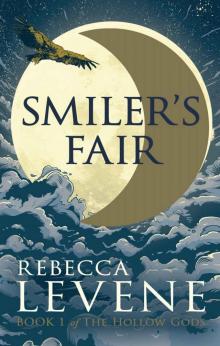 Smiler's Fair: Book I of The Hollow Gods
Smiler's Fair: Book I of The Hollow Gods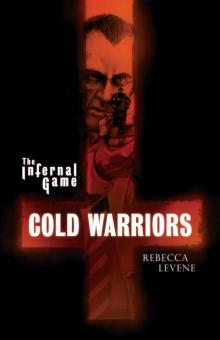 Cold Warriors
Cold Warriors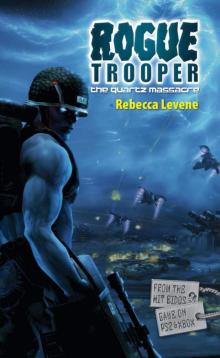 The Quartz Massacre
The Quartz Massacre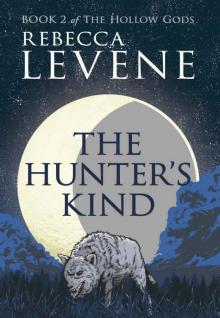 The Hunter's Kind: Book II of The Hollow Gods
The Hunter's Kind: Book II of The Hollow Gods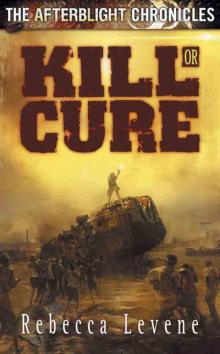 Kill or Cure
Kill or Cure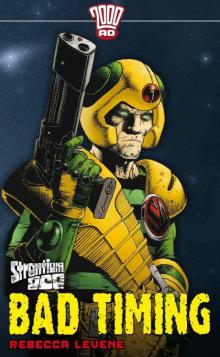 Bad Timing
Bad Timing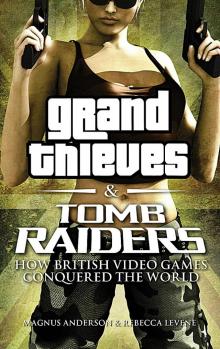 Grand Thieves & Tomb Raiders
Grand Thieves & Tomb Raiders Ghost Dance
Ghost Dance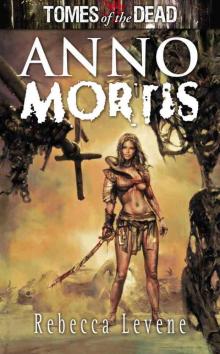 Anno Mortis
Anno Mortis